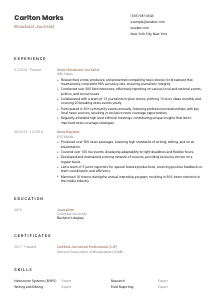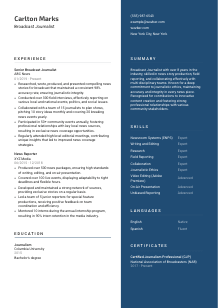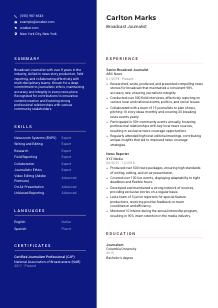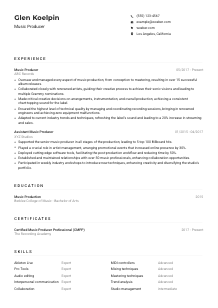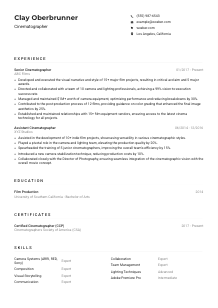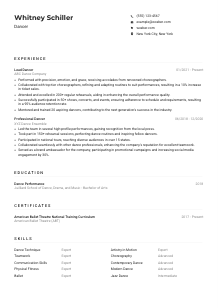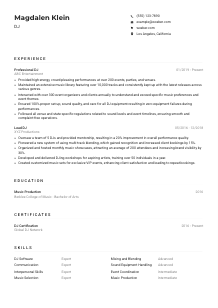Broadcast Journalist Resume Example
Reporting live, but your resume feels pre-taped? Dive into this Broadcast Journalist resume example, carved with Wozber free resume builder. Uncover how to seamlessly intertwine your on-air charisma with job specifics, scripting a career that's always ready for prime time!
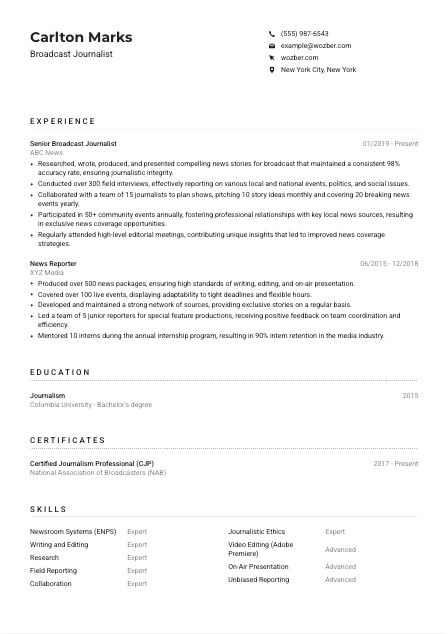
How to write a Broadcast Journalist Resume?
Hello, aspiring Broadcast Journalist! In the whirlwind media landscape, carving out a standout career begins with a compelling resume. Your resume isn't just a document; it's a narrative of your professional saga, showcasing your expertise and alignment with your dream role. With the power of Wozber free resume builder, this guide is tailored to help you navigate the nuances of constructing a resume that resonates with the requirements of a Broadcast Journalist position.
Leveraging ATS-friendly resume formats and optimization, let's transform your resume into a beacon for opportunities, ensuring it's primed for both human eyes and Applicant Tracking Systems (ATS). Ready to turn the spotlight on your prowess? Let's chart the course to a captivating resume that leads to action!
Personal Details
In the storytelling domain of broadcast journalism, your resume's Personal Details section is the headline that captures attention. It establishes your professional identity and ensures you're reachable. Let's tailor this section with precision, reflecting the essentials for a Broadcast Journalist role.
1. Name as Your Byline
Think of your name as the byline on a lead story. It should grab attention. Ensure it's highlighted with a clear, legible font on your ATS-compliant resume. This is your first impression, your brand—make it count.
2. Job Title Precision
Just below your name, align with the targeted role by mentioning "Broadcast Journalist." This strategic placement instantly communicates your professional aim and aligns with the job description, making it easier for the ATS and recruiters to see you're a match.
3. Contact Info Clarity
Your phone and professional email address are your direct lines. Double-check for accuracy to ensure opportunities find their way to you. Opt for a straightforward email format like firstname.lastname@email.com for a polished look.
4. Location: Fitting the Bill
"Located in New York City, New York" directly satisfies one of the job requirements. Mentioning your city and state confirms your readiness and availability, eliminating any potential concerns about relocation.
5. Web Presence
Incorporate your LinkedIn profile or professional website to offer a deeper dive into your accomplishments. Ensure they are updated and echo the achievements and skills listed on your resume.
Takeaway
Craft this section as your resume's opening shot—concise, precisely aimed, and professional. Matching the job's logistical requirements right off the bat sets a confident tone for the narrative that follows. It's your digital handshake, inviting the reader to explore your professional story further.





Experience
The Experience section is your prime-time feature—where your career highlights take the stage. It's about more than just where you've worked; it's about showcasing the impact you've made. Tailoring this section to the Broadcast Journalist role means spotlighting your most relevant accomplishments with an eye on the job description.
- Researched, wrote, produced, and presented compelling news stories for broadcast that maintained a consistent 98% accuracy rate, ensuring journalistic integrity.
- Conducted over 300 field interviews, effectively reporting on various local and national events, politics, and social issues.
- Collaborated with a team of 15 journalists to plan shows, pitching 10 story ideas monthly and covering 20 breaking news events yearly.
- Participated in 50+ community events annually, fostering professional relationships with key local news sources, resulting in exclusive news coverage opportunities.
- Regularly attended high‑level editorial meetings, contributing unique insights that led to improved news coverage strategies.
- Produced over 500 news packages, ensuring high standards of writing, editing, and on‑air presentation.
- Covered over 100 live events, displaying adaptability to tight deadlines and flexible hours.
- Developed and maintained a strong network of sources, providing exclusive stories on a regular basis.
- Led a team of 5 junior reporters for special feature productions, receiving positive feedback on team coordination and efficiency.
- Mentored 10 interns during the annual internship program, resulting in 90% intern retention in the media industry.
1. Role Alignment
Kick off by matching your past roles with the job description. For instance, showcasing your tenure as a "Senior Broadcast Journalist" directly relates to what recruiters are looking for. It speaks to your expertise and positions you as a fitting candidate.
2. Narrative of Achievements
For each role, weave a narrative of your achievements. Mention how you "Researched, wrote, produced, and presented compelling news stories with a 98% accuracy rate," demonstrating your commitment to journalistic integrity and excellence. This tells a story of professionalism and dedication.
3. Numbers Speak Volumes
Quantify your accomplishments wherever possible. Showcasing that you've "Conducted over 300 field interviews" or "Collaborated with 15 journalists" provides tangible proof of your extensive experience and teamwork skills.
4. Relevance is Key
Filter your experience to spotlight roles and achievements that align with the Broadcast Journalist job requirements. Prioritize experiences that demonstrate strong writing, editing, field reporting, and collaboration skills.
5. Continual Growth
Illustrate your journey of growth, highlighting progression from roles like "News Reporter" to "Senior Broadcast Journalist." This trajectory signals to potential employers that you're driven and capable of advancing in your career.
Takeaway
In crafting your Experience section, think of it as your professional highlights reel. Each entry is a testament to your qualifications for the Broadcast Journalist role. Focus on achievements that resonate with the job you're targeting, using numbers to amplify your impact. This is your chance to show—not just tell—why you're the ideal candidate.
Education
The Education section of your resume isn't just a listing of degrees; it's evidence of your foundational knowledge and your journey to becoming a Broadcast Journalist. Here, we'll calibrate your educational background to underscore its relevance and alignment with the requirements of the role.
1. Degree Relevance
Start by ensuring your degree directly matches the job's requirements. Having a "Bachelor's degree in Journalism" as specified shows you have the essential academic foundation required for the role.
2. Clear Structure
Present your academic credentials in a straightforward format: degree title, field of study, university name, and graduation date. This organization makes it easy for recruiters and ATS to quickly understand your educational background.
3. Degree Specificity
"Bachelor's degree in Journalism" should be prominently listed to match the job criteria perfectly. This resonates with the job's educational requirement and highlights the pertinent nature of your academic preparation.
4. Course Context
If applicable, especially for those early in their careers, listing relevant courses can add depth to your educational credentials. However, for experienced professionals, the focus should remain on the degree and field of study.
5. Supplementary Achievements
Inclusion of any honors, clubs, or relevant projects can add a rich layer to your profile, provided they demonstrate skills or knowledge applicable to a Broadcast Journalist role. Yet, the priority should be the direct alignment of your education with the role's requirements.
Takeaway
Your educational background lays the foundation of your professional narrative. Highlighting a degree that aligns perfectly with the job requirements underlines your preparedness for the role. Ensure this section is structured for easy reading, making it straightforward for both ATS and hiring managers to recognize your qualifications. Remember, the goal is to affirm your academic credentials are in harmony with the demands of the Broadcast Journalism field.
Certificates
In the evolving landscape of broadcast journalism, certificates can underscore your commitment to continuous learning and specialization. While the job may not explicitly require certifications, presenting relevant ones can set you apart and showcase your expertise in specific areas.
1. Identifying Relevance
Pinpoint certificates that enhance your qualification for the Broadcast Journalist role. Though not explicitly mentioned in the job description, a "Certified Journalism Professional (CJP)" designation validates your dedication to the craft.
2. Selective Highlighting
Focus on including certificates that showcase skills or knowledge directly pertinent to the job's demands. This strategic selection ensures the hiring manager's attention is drawn to your most relevant qualifications.
3. Date Specification
Mentioning the acquisition or validity dates of certifications, like "2017 - Present" for the CJP, provides context regarding your recent achievements and up-to-date expertise.
4. Ongoing Learning
The media industry never stands still, and neither should your learning. Emphasize recent or ongoing certifications to demonstrate your commitment to keeping pace with industry advancements.
Takeaway
Certificates can enhance your broadcast journalism resume by showcasing your specialized knowledge and commitment to professional growth. Selectively include certifications that bolster your relevance for the role, presenting you as a well-rounded and updated candidate. With certifications, you're not just listing qualifications; you're highlighting a trajectory of continuous learning and adaptation.
Skills
The Skills section of your resume is your professional arsenal—listing the tools, techniques, and talents at your disposal. For a Broadcast Journalist, this section spotlights the hard and soft skills that underscore your capability to excel in the role. Let's fine-tune this section to make your skillset resonate loudly with the job demands.
1. Unpack the Job Description
Start by dissecting the job description for both stated and implied skills. Phrases like "strong writing, editing, and on-air presentation skills" should guide the skills you choose to highlight.
2. Tailoring Your Toolkit
Align your listed skills with those sought by the job. If "proficiency in video editing software" is a requirement, listing "Video Editing (Adobe Premiere)" as a skill directly matches job specifications. This intentional alignment shows you're not just a fit; you're the perfect puzzle piece.
3. Precision and Focus
Resist the temptation to list every skill you possess. Instead, concentrate on the ones most relevant to a Broadcast Journalist. Skills in "Research," "Field Reporting," and "Unbiased Reporting" are particularly compelling, addressing the core of broadcast journalism.
Takeaway
In sculpting your Skills section, envision it as a showcase of your most broadcast-worthy talents. By aligning your skills with the role's requirements, you spotlight your readiness to take on the challenges of the Broadcast Journalist position. Keep this section sharp and focused, making it clear that you possess the exact skill set the job demands. Your skills are a reflection of your professional identity—make them count!
Languages
In an interconnected world, the ability to communicate across cultural and linguistic barriers is invaluable, especially in journalism. The Languages section offers a glimpse into your ability to engage with diverse audiences and sources. Let's tailor this section to broadcast your linguistic capabilities, an asset in the globalized field of journalism.
1. Alignment with Job Necessities
First, hone in on languages explicitly mentioned in the job posting. For a Broadcast Journalist, "the ability to articulate in English clearly" is a must. Ensuring you've highlighted English as a "Native" proficiency meets a critical requirement.
2. Promoting Multilingual Skills
While the job description emphasizes English, adding "Spanish: Fluent" showcases your capability to report and communicate in another widely spoken language, broadening your appeal and potential audience reach.
3. Honest Proficiency Ratings
Be transparent about your language proficiency levels. This demonstration of self-awareness reassures hiring managers of your genuine capabilities and positions you as a credible candidate.
4. The Value of Diversity
Even if not specified, additional languages can distinguish you in a crowded field, highlighting your versatility and potential for covering stories with an international angle. It's a nod to your ability to navigate the multicultural landscape of news.
5. Role-Specific Benefits
For roles that may benefit from regional or global insights, your language skills are not just a personal asset; they're a professional advantage. Understanding the specifics of the Broadcast Journalist role can help you highlight languages that align with potential coverage areas or audience demographics.
Takeaway
Crafting your Languages section is about more than listing the languages you speak; it's about showcasing your capability to connect and communicate in a world where stories transcend borders. Your linguistic skills can amplify your appeal as a Broadcast Journalist, underlining your readiness to engage with a diverse array of sources and audiences. Leverage this section to outline your global perspective and your potential to bring a richer, more varied narrative to the newsroom.
Summary
A compelling Summary section is the clincher in your resume, encapsulating your essence as a Broadcast Journalist. It's the teaser that hooks the recruiter's interest, inviting them to explore your professional narrative further. Tailoring this section to mirror the Broadcast Journalist position's requirements can give you a commanding lead. Let's craft a Summary that broadcasts your unique value proposition.
1. Capturing the Essence
Begin by absorbing the core demands of the Broadcast Journalist role. Envision how your career encompasses those needs. Your summary should articulate this alignment, illustrating how your experience and skills make you the ideal candidate.
2. A Strong Opening
Initiate with a compelling introduction. Consider phrases like, "Seasoned Broadcast Journalist with over 8 years in the industry." This positions you as an experienced professional right from the start.
3. Highlighting Key Attributes
Mention a blend of your most pertinent skills and achievements such as, "known for a deep commitment to journalistic ethics and maintaining accuracy and integrity in every news piece." This directly aligns with the role's demands for precision and trustworthiness.
4. Brevity and Impact
Keep it succinct yet striking. Your summary should be a crisp overview, enticing hiring managers to delve deeper into your resume. Striking the right balance between brevity and impact is key.
Takeaway
Your Summary is the headline of your professional story. By encapsulating your qualifications, experience, and the unique qualities you bring to the forecasted role, you set the stage for a deeper exploration of your candidacy. Carefully tailor this section to the Broadcast Journalist position, making it a compelling invitation to read on. Let your summary broadcast not just who you are, but who you aspire to be in your professional journey.
Launching Your Broadcast Journalist Journey
Congratulations on reaching the end of this guide! You're now equipped with tailored insights to craft a Broadcast Journalist resume that resonates with precision and professionalism. Remember, your resume is more than a document—it's a narrative of your career, an advocate of your potential. With Wozber's free resume builder, ATS-friendly resume templates, and ATS resume scanner, optimizing your resume for a Broadcast Journalist position becomes an empowering journey.
Fine-tune each section, instill your unique essence, and step forward with confidence. The newsroom awaits your story. Here's to your success and the impact you're about to make!

- Bachelor's degree in Journalism, Broadcasting, or a related field.
- Minimum of 3 years of experience in broadcast journalism or a related media field.
- Strong writing, editing, and on-air presentation skills.
- Proficiency in video editing software and familiarity with newsroom systems.
- Ability to work under tight deadlines and adapt to flexible schedules.
- The job requires the ability to articulate in English clearly.
- Must be located in New York City, New York.
- Research, write, produce, and present news stories for broadcast, ensuring accuracy and journalistic integrity.
- Conduct field interviews and report on various local or national events, politics, and social issues.
- Collaborate with the news team to plan shows, pitch story ideas, and cover breaking news.
- Attend editorial meetings, contributing ideas and insights for news coverage.
- Participate in community events and maintain professional relationships with local news sources and organizations.





